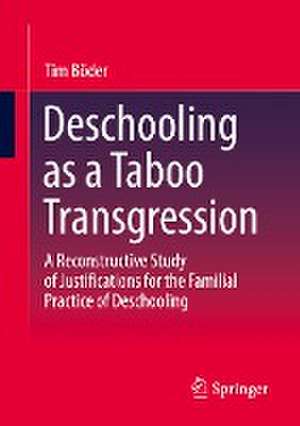Deschooling as a Taboo Transgression: A Reconstructive Study of Justifications for the Familial Practice of Deschooling
Autor Tim Böderen Limba Engleză Paperback – 21 ian 2023
With the realization of familial deschooling in Germany, the so-called social movement of the ,Freilerner’ transgresses a taboo and is therefore under enormous pressure to justify itself. Following on from this, the reconstructive study asks what latent structures of meaning underlie the subjective crisis scenarios about the schooling of children and the ideal concepts of parents in the sense-giving justification of the family deschooling practice. In the course of this, three types of the justification for the familial practice of deschooling, namely defending, charismatizing, and escaping, are empirically established. In this way, the study not only makes an empirically based contribution to a more reflective discourse on alternative educational practices, but also pushes itself into a taboo zone of school pedagogy and educational research in Germany. Because it addresses the school as a historically consolidated, but not as an organization without alternatives for learning andeducational processes of children and adolescents.
Preț: 577.40 lei
Preț vechi: 679.29 lei
-15% Nou
Puncte Express: 866
Preț estimativ în valută:
110.52€ • 120.09$ • 92.90£
110.52€ • 120.09$ • 92.90£
Carte tipărită la comandă
Livrare economică 21 aprilie-05 mai
Preluare comenzi: 021 569.72.76
Specificații
ISBN-13: 9783658398170
ISBN-10: 3658398175
Pagini: 160
Ilustrații: XI, 160 p. 3 illus.
Dimensiuni: 148 x 210 mm
Greutate: 0.24 kg
Ediția:1st ed. 2023
Editura: Springer Fachmedien Wiesbaden
Colecția Springer
Locul publicării:Wiesbaden, Germany
ISBN-10: 3658398175
Pagini: 160
Ilustrații: XI, 160 p. 3 illus.
Dimensiuni: 148 x 210 mm
Greutate: 0.24 kg
Ediția:1st ed. 2023
Editura: Springer Fachmedien Wiesbaden
Colecția Springer
Locul publicării:Wiesbaden, Germany
Cuprins
Introduction.- Subject conception: unschooling as a transgression of taboo.- Research question, research design and research moral reflections.- Case studies on the justification of family unschooling practices.- Balance of structural variants on the justification of family unschooling practices.- Abstraction and further reflection.- Bibliography.
Notă biografică
Dr. Tim Böder is a postdoctoral researcher at the Faculty of Education, University of Duisburg-Essen, Germany. His research focuses on school culture, delimitations of the pedagogical and deschooling; youth, youth culture and politics; qualitative-reconstructive methods and methodologies.
Textul de pe ultima copertă
With the realization of familial deschooling in Germany, the so-called social movement of the ,Freilerner’ transgresses a taboo and is therefore under enormous pressure to justify itself. Following on from this, the reconstructive study asks what latent structures of meaning underlie the subjective crisis scenarios about the schooling of children and the ideal concepts of parents in the sense-giving justification of the family deschooling practice. In the course of this, three types of the justification for the familial practice of deschooling, namely defending, charismatizing, and escaping, are empirically established. In this way, the study not only makes an empirically based contribution to a more reflective discourse on alternative educational practices, but also pushes itself into a taboo zone of school pedagogy and educational research in Germany. Because it addresses the school as a historically consolidated, but not as an organization without alternatives for learning and educational processes of children and adolescents.
The Author
Dr. Tim Böder is a postdoctoral researcher at the Faculty of Education, University of Duisburg-Essen, Germany. His research focuses on school culture, delimitations of the pedagogical and deschooling; youth, youth culture and politics; qualitative-reconstructive methods and methodologies.
The Author
Dr. Tim Böder is a postdoctoral researcher at the Faculty of Education, University of Duisburg-Essen, Germany. His research focuses on school culture, delimitations of the pedagogical and deschooling; youth, youth culture and politics; qualitative-reconstructive methods and methodologies.
